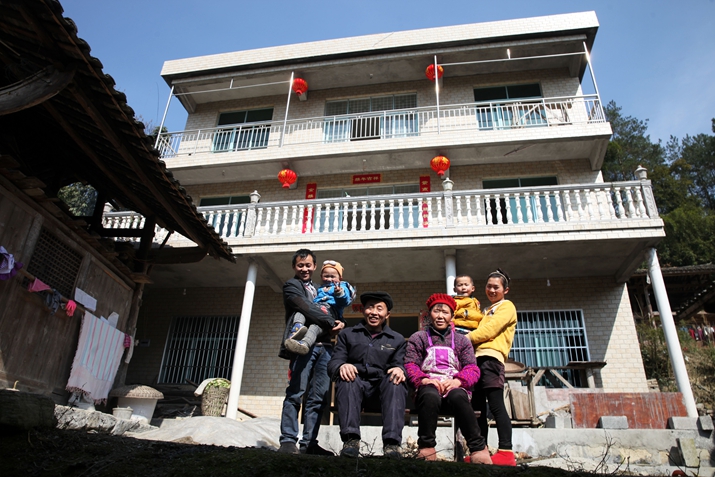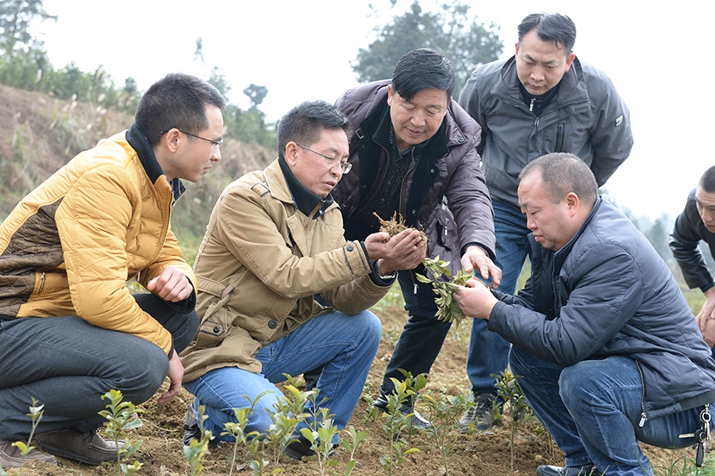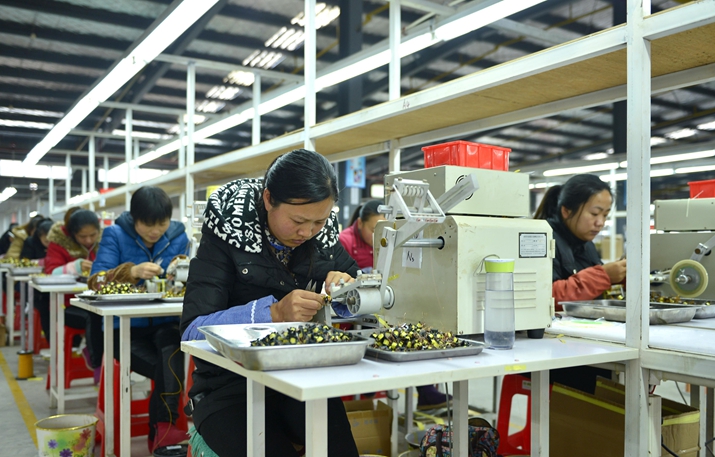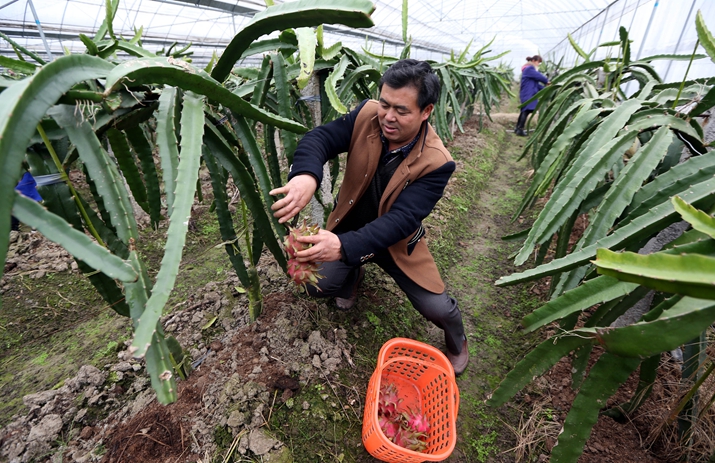|
|||||||||||
|
|
| Rooting Out Poverty |
| China is determined to eradicate poverty across the nation by 2020 |
| By Yin Pumin |
 |
| The family of Xu Chaoting, a farmer with disabilities in a poverty-stricken village in Chongqing Municipality, take a picture in front of their new house built with the aid of the government on February 7 (XINHUA) |
Since the rural population of China accounts for about 50 percent of the country's total, poverty alleviation measures in rural areas has long been one of the major concerns of the Chinese Government.
"Poverty alleviation endeavors must be carried out in a precise manner, with different measures rolled out targeting different types of people and households," said Chinese President Xi Jinping during his tour in Jiangxi Province on February 1-3.
"Not a single family living in poverty is to be left behind in our path," he stressed.
Earlier, at a group study of the Political Bureau members of the Communist Party of China (CPC) Central Committee in January, the president pledged to make an all-out effort to ensure that all impoverished farmers will be lifted out of poverty by 2020.
In the past three decades, China has lifted more than 600 million people out of penury, accounting for an estimated 70 percent reduction of worldwide poverty.
China was the first developing country to meet the UN Millennium Development Goals (MDGs) ahead of its target which outlined the halving of a country's number of poor people by 2015.
"Despite the achievements, China remains the world's largest developing country, and narrowing the urban-rural gap remains a big challenge for us," Xi said in October last year while addressing the Global Poverty Reduction and Development Forum in Beijing.
At the end of 2014, China still had more than 70 million people living below the country's poverty line of 2,300 yuan ($375) in annual income by 2010 price standards.
When the nation's lawmakers and policy advisers gather in Beijing in early March for the annual sessions of the National People's Congress and the National Committee of the Chinese People's Political Consultative Conference, poverty alleviation will be high on their agenda.
 |
| On January 30, officials in Wudang District of Guiyang, the capital city of Guizhou Province, come to a local village that they are assigned to help the villagers out of poverty. They were there to see the growth of the tea plants financed with the aid of the local government (XINHUA) |
More targeted measures
How to lift the remaining 70 plus million people out of poverty is a big challenge that the Central Government is faced with, as the nation is striving to achieve the goal of building a moderately prosperous society.
In December 2015, the CPC Central Committee and the State Council jointly released instructions for poverty alleviation, calling for creative ideas and methods to address poverty.
The document suggested that more targeted and precise measures are needed to help those living in poverty in rural areas obtain basic living standards by 2020.
These measures include developing industries, improving education and medical services, building adequate infrastructure and facilities, helping migrant workers find jobs, and relocating people that live in hostile conditions and fragile environments to more prosperous areas.
The document came out after a state council meeting on poverty alleviation in November last year, at which the goal of eliminating nationwide poverty by 2020 was reiterated. Specifically targeted measures designed to help poor people in rural areas shake off poverty were pushed forward, breaking from the previous "one-size-fits-all" policy.
"The method of extensive poverty relief used in the past no longer works when it comes to the most impoverished families. Targeted relief and customized policies are needed to help each household," said Wang Sangui, a professor with the School of Agricultural Economics and Rural Development of Beijing-based Renmin University of China, in an article by Xinhua News Agency.
Wang believed that effective poverty relief relies on precisely identifying particularly needy groups. "Identifying the needs of the poor is the first step in the poverty relief battle and only by fully understanding the problem can policymakers deliver the targeted measures proposed by the central authorities for the 13th Five-Year Plan (2016-20)," claimed Wang.
Guided by that policy, a database was created in 2014 to record the basic information of indigent people throughout the country. In 2016, the database will be completed, tabulating the poor to help lift them out of poverty more efficiently and effectively.
"The database is fundamental for the government to launch poverty alleviation policies more precisely," said Liu Yongfu, head of the State Council Leading Group Office of Poverty Alleviation and Development, at its meeting in November last year.
 |
| A company specializing in electronic products in Xuanen County, Hubei Province, provides free training to local women from rural areas in December 2015 (XINHUA) |
At the meeting, President Xi urged local governments and officials to make poverty alleviation the top priority during the next five years.
Xi emphasized that industrial development is crucial to poverty alleviation. Local resources should be utilized optimally in order to develop a variety of industries and ensure employment for the jobless.
He also promised more financial support to poverty relief work. According to the official figures, the anti-poverty funds from the Central Government maintained 18.1 percent of annual growth from 2011 to 2014. In 2015, China further increased the budget to 46.75 billion yuan ($7.63 billion).
Even though China's economic growth is currently slowing down, financial support will not be cut, but will actually be increased during the next five years. This indicates the central leadership's determination to root out poverty, according to Li Shi, Director of the Institute for Income Distribution and Poverty Studies at Beijing Normal University.
The Central Government has said that it also welcomes private investments--as well as people from all walks of life--to join the battle against poverty.
As for local governments, they will undergo stricter performance assessments regarding their poverty alleviation measures in the future, and will be punished more severely if funds assigned to fighting poverty are misappropriated.
 |
| Yi Jialiang, a villager from Luxi, Jiangxi Province, checks his dragon fruit field on January 8. The plantation has provided more than 50 jobs to people in neighboring areas (XINHUA) |
New crowdfunding strategy
Among the measures being used for poverty relief, crowdfunding--a novel practice for companies and individuals to raise money from a large number of people--has proved successful in some rural communities.
In north China's Shanxi Province, villagers are confident about their ability to make ends meet. "I work at a cooperative union in my village and earn 2,000 yuan ($326.26) each month. With my promised dividends, my family will undoubtedly walk out of poverty in the near future," said Zhang Baojun, a villager from Baijiatan Village in Loufan County.
There are four members in Zhang's family, including his 80-year-old mother and his son who is attending college. Due to the harsh natural conditions and Zhang's own kidney illness, his family mainly depended on the country's low subsistence allowance in the past.
In his village, which lies in the valley of the Luliang Mountain, there are 95 families, totaling 290 individuals, living in conditions like Zhang's. Despite efforts from central and local governments in recent years, the options available to earn a living were still scarce.
That situation had not changed until the idea of crowdfunding was introduced to the village in 2014.
After conducting careful studies into the matter, the Shanxi Securities Regulatory Bureau helped the villagers form two equity-based cooperative unions to support the village's chicken-breeding and goat-breeding industries. This helped the villagers collect more than 1.7 million yuan ($260,245) in funds from over 20 organizations.
In order to apply the money more efficiently, the bureau lent 700,000 yuan ($107,159) to those 95 poverty-stricken families without interest. The families could then invest the money into the two cooperative unions as shareholders. The rest of the 1.7 million yuan went to the cooperative unions as running funds with normal interest rates. With the money, the cooperative unions built two large-scale breeding farms for their chickens and goats.
"In the past, we could only raise a maximum of 6,000 chickens. But today, with the crowdfunded money, we can easily raise 20,000 chickens," You Cunlin, head of the two cooperative unions, told Xinhua.
You Aizhong, the village chief, also told Xinhua that crowdfunding has effectively helped reduce the living pressures on those poverty-stricken families. "They can get their dividends every year without debt and risk," he said.
According to You, the scale of chicken breeding is expected to reach 50,000 in three years and the net annual profits will reach 1 million yuan ($163,132). "Taking out 800,000 yuan ($129,032) for dividends, each poverty-stricken villager can earn 2,758 yuan ($445) by then," You said.
"As a financial and market tool, crowdfunding can effectively solve the problem of funding shortages that those poor families face, and it also helps them start their own business," said Sun Cairen, Director of the Shanxi Securities Regulatory Bureau, in the same article by Xinhua.
Crowdfunding has since been introduced to more regions in the country, including the provinces of Gansu, Hubei and Guizhou.
|
|||
| Copyright ChinAfrica All right reserved 京ICP备08005356号 |